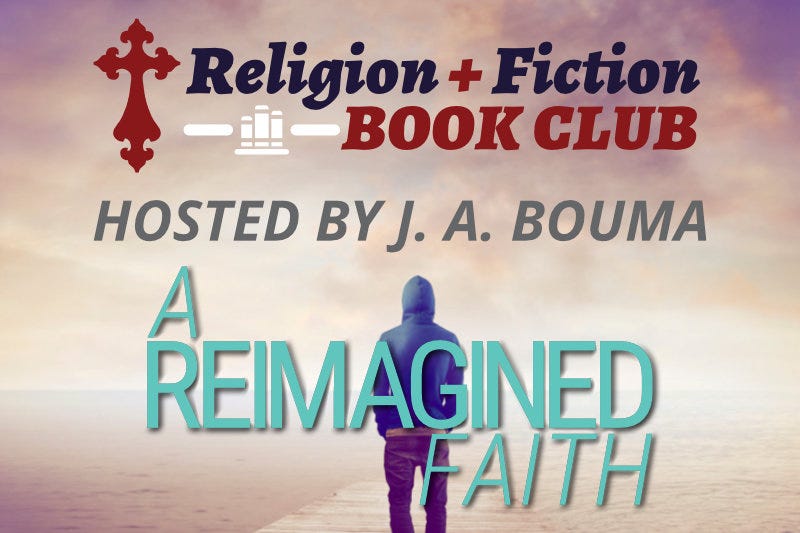We’re back with week 2 of the second Religion + Fiction Book Club! Thanks for your interest and for joining in the fun.
If you missed the introduction episode to more of the background behind the book, including my own spiritual journey that led to me writing it, you can listen to that episode HERE. Catch up with the first week and feel free to join in anytime.
The schedule will run as follows with links to past episodes:
Below are some of the questions I posed in the book club episode that I hope get you thinking about Peter Daniel Young’s story — and your own. Comment below or use the questions in a group or individual study to deepen your engagement with the story.
Week 2 Thoughts + Questions
After a sort of crisis of faith is sparked in Peter after being confronted with questions from friends he wasn’t prepared to answer, the tension and inner conflict is deepened on a work trip and then with a lunch discussion. All of which ratchets the external tension and conflict with relationships that wonder what on earth is going on with him and his faith. Peter’s wondering the same!
Chapter 8
The main point of inner conflict and tension for Peter comes when he is confronted with this question: What is the gospel, what is the good news of Jesus and the essential message of the Christian faith?
How did Peter’s ministry and bosses answer this question? What issues did this answer stir in Peter, and how did it deepen his conflicting feelings about his faith?
How have you answered this question for yourself?
When have you questioned something at the heart of your faith? What was that like, what happened? How did others react to that questioning? How did you resolve it?
Because Peter was in ministry and felt he should have all the answers, he felt like a fraud when he began to questioning it all. Yet Ainsley suggested instead: “Or maybe you’re more authentic than you’ve ever been.” What did she mean by this? Why was she right?
What does it mean that we live in a post-Christian world? How have you seen this evident in your own community? How does this impact how we connect the Christian faith to our culture, as Peter began to consider?
Truth and power are two dynamic lenses through which postmodernism engages the deep questions of life. How have you seen this dynamic played out in our world, in your relationships? How might it impact Christianity, and the way it connects with culture?
Chapters 9-11
Because Peter is frustrated with how we’ve been living as Christians in a post-Christian, postmodern world, and how we share the Christian message, believing we need to rethink both, Ainsley suggests he should create an alternative to Everyday Evangelism. Pages 74-77 reflect this new way of thinking about and communicating the good news of the Christian story, which reflects my own thinking 20 years ago and even still as a minister.
How have you understood the Christian message and how has it been communicated to you? How have you yourself communicated it? How similar or different have both been to what Peter envisions?
Peter’s reimagining his faith and pushback begins to raise questions with his boss, Roger. This reaction was something similar to what I myself experienced during my own crisis of faith.
When have you pushed back in similar ways against the way things have always been done in your church or faith community? What was that like, and what happened?
One of the themes in these chapters is the generational tension between the traditional and emerging generations. Like Peter, I myself had a bit of a tone problem in my pushback, coming across as prideful and arrogant in my reimagining. Then again, I also encountered some of the entrenchment in traditionalism, like Peter with Roger.
What do you think both older generations and traditionalists, as well as younger and emerging generations need to keep in mind when it comes to issues of faith? How might they learn from one another?
I have had many “Bernies” in my life, people who have walked with me and shaped my Christian life. These guides on the side are crucial for us as we grow in our faith.
Who has been your Bernie, the allies in your faith journey? How did they sit with you and your questions, how did they help you grow?
Are you a Bernie to someone? If so, who and how has that experience been? If not, how might it look to take on a “Timothy” as I mentioned, to intensionally come alongside someone in their spiritual journey?
Chapter 12
Who among these characters in this chapter do you most relate to, especially in the way they question or push back against issues of faith? Explain.
What are some of major ways these characters are questioning their faith? Who have you known who has voiced similar questions, or what other ways have you found people pushing back against Christianity?
One of the key questions for any person is the same one Jesus asks in Mark 8: “Who do you say I [Jesus] am?” How would you answer that question? How did it provoke discussion among Peter and his friends?
Before ending their lunch discussion, Peter has some parting words:
“Thanks for sharing some of your story, Sam. And, guys, thanks for this. Thanks for your openness and honesty. Thanks for listening to each other, even though it might have been hard at times. Know that you’re not alone in your doubts. Know that Jesus can handle your doubts, that he invites you to explore those doubts. But also know that he is calling you out of doubt and into belief. But however long it takes you to get there, I totally believe he’s with you every step of the way.”
What are the doubts you yourself carry—whether about faith generally or Christianity specifically? How do you see Jesus walking alongside you through them right now? How might he be calling you into belief?
Again, thanks for joining the book club. Hope you can join next week!
You can still join at anytime, going at your own pace reading the book and listening to the episodes. Grab it for all ereaders at most online retailers if you’d like to join, or get it direct from my bookshop at 25% off with code BOOKCLUB25. For easy links:
J. A. Bouma believes nobody should have to read bad religious fiction—whether it’s cheesy plots with pat answers or misrepresentations of the Christian faith and the Bible. So he tells compelling, propulsive stories that thrill as much as inspire, while offering a dose of insight along the way. Available at most online retailers and direct: shop.jabouma.com.









Share this post